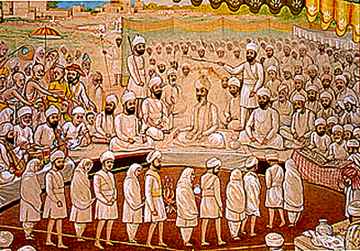
The master-planner of the Namdhari movement Shri Satguru Ram Singh was born in a small village Bhaini in Ludhiana district of the Punjab on the Basant Panchmi day of the year 1816 A.D. He came of a family of poor, honest, hardworking and God-loving peasants engaged in agriculture. His father was Baba Jassa Singh who ran a carpen-ter's workshop, where the village peasants got their agri-cultural implements made and repaired.
As a young man of tender age he used to graze cows along with other boys of the village. He developed love for cattle as well as his comrades. His mother Sada Kaur by name was a pious woman and taught him the daily prayer of Sikh religion. He began to say his daily prayers regularly before the age of ten. At the age of 12, he assisted his father in the fields, handled the plough, and performed manual labour.
At the age of 20, Guru Ram Singh joined the ranks of the Army of Maharaja Ranjit Singh of the Independent Punjab, in the Artillery regiment. On one occasion probably during the first Anglo-Afghan war when his regiment was on duty in Peshawar area, he along with his other colleagues visited Guru Balak Singh at Hazro. Guru Balak Singh was much impressed with him, and permitted him to teach and spread the Gospel of Sikh religion.
After the death of Maharaja Ranjit Singh in the year 1839, chaos and anarchy spread at the court. In a short period of 5 years, 2 rulers were killed, 3 ministers were murdered and several nobles of the court lost their lives. The Army became the virtual Dictator. The promises of enhanced pay and rewards, by the unscrupulous court magnets, brought political ruin and moral degradation.
Almost everyone, who had wealth, power, or influ-ence, thought for himself and none for the state. Guru Ram Singh felt exasperated, and foresaw the ruin and extinction of the state. He openly condemned the leaders as well as the soldiery for their suicidal activities. He forbade the coming destruction and annihila-tion attendant on their doings. Several times his superior officers punished him for his open accusation of men in power. On the eve of the First Anglo-Sikh war in December 1845, he informed his colleagues, that nothing but ruin awaited the Lahore Army on the banks of Sutlej. His solitary voice remained unheard. In utter disgust and dismay, he threw his musket in the river on the night before the battle of Mudkee and left for his home. Treachery and diplomacy rather than military tact and bravery on the field of battle, brought victory to the British. The Punjab lay prostrate at the feet of the foreigners.
As a result of this war, the British sold Kashmir to Maharaja Gulab Singh in exchange for the War indemnity. The political connections of Kashmir State were directly established with the British Governor General of India. The Russian advance in Turkistan was to be checked on the northern slopes of India's natural barriers i.e. the mountains of Kashmir. The British fomented the second Anglo-Sikh war of 1849 diplomacy Maharaja. Dalip Singh, the minor son of Maha-raja Ranjit 8ingh, was deposed, and sent to England as a political pensioner. The Punjab became a part of the British Empire in India. The prophecy, which Guru Ram Singh had made 4 years ago, became true.
Guru Ram Singh engaged himself in agriculture on his return from the Army. A shop was opened in the village for supplying the needs of the village folks of the surrounding area. Dealings in grain and cattle were also carried. A few sincere admirers and old comrades of the army service days, gathered around him, and shed bitter tears over the political thralldom of' motherland. After careful considera-tion, Guru Ram Singh chalked out a comprehensive programme. It was proclaimed in the gathering called for this purpose on the 13th and 14th April 1857.
The basic principles of the movement in the words of Shri Doctor Rajinder Prasad , the Rashtrapati (President)of India, as given in an article published in 'Satyug' March1935, were as follows.
"Guru Ram Singh believed the political freedom a part of religion. The organisation of the Namdharies became considerably strong. The movement of Boycott and Non-co-operation, which Mahatma Gandhi started so vigorously in our own times, was preached by Guru Ram Singh fifty years ago, as a cult, for the Namdharies."
Guru Ram Singh's Non-co-operation movement contained the following five essentials:- 1. Boycott of Government Services. 2. Boycott of educational institutions opened by the British. 3. Boycott of Law courts started by the British. 4. Boycott of foreign-made goods. 5. To refuse to obey and resist the laws and orders, which one's conscience abhors."
It was after six years, that the British officers came to know of the existence of this movement. By that time, the number of Namdharies had considerably increased throughout the Punjab, Punjab States, and other places in India.
